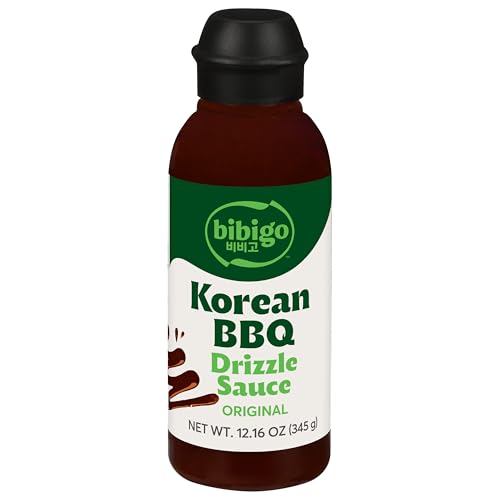Irresistible Korean BBQ Sauce: 5 Flavor-Packed Ways to Use It!
If your taste buds are bored and begging for excitement, Korean BBQ sauce is about to become your new obsession. Think sweet, savory, garlicky, and just the right touch of heat. It’s a flavor rollercoaster in a bottle (or bowl, if you’re making it at home).
This isn’t just a sauce. It’s the soul of Korean barbecue. Whether you’re grilling bulgogi, dipping crispy dumplings, or spicing up your tofu, Korean BBQ sauce adds bold, umami-packed magic to anything it touches. And the best part? You don’t need to fly to Seoul to enjoy it. We’re bringing the heat right to your kitchen.
In this guide, we’ll explore everything from what’s in Korean BBQ sauce to how to make your own, how to use it, and even the best store-bought brands. Ready to level up your BBQ game?
Table of Contents
What Is It, Really?
This sauce is a bold and flavorful condiment used in many traditional Korean dishes. Unlike its American counterparts, it skips the heavy smokiness and instead leans into rich, umami-packed ingredients like soy sauce, sesame oil, garlic, and fermented chili paste.
It can be used as both a marinade and a dipping sauce. The texture is usually smooth and glossy, making it ideal for glazing grilled meats or serving alongside appetizers.
Instead of ketchup-like sweetness, it offers a perfect balance of salty, sweet, tangy, and spicy. It’s the secret flavor base in popular dishes like bulgogi and galbi, but also works beautifully in unexpected ways—on burgers, roasted vegetables, or fusion recipes.
In short, this sauce blends tradition with bold taste, delivering a punch of complexity that elevates any meal.
Key Ingredients in Korean BBQ Sauce
The magic of Korean BBQ sauce lies in its bold blend of sweet, salty, spicy, and savory flavors. Whether you’re whipping it up at home or checking the label on your favorite bottle, here are the essential ingredients that bring it to life:
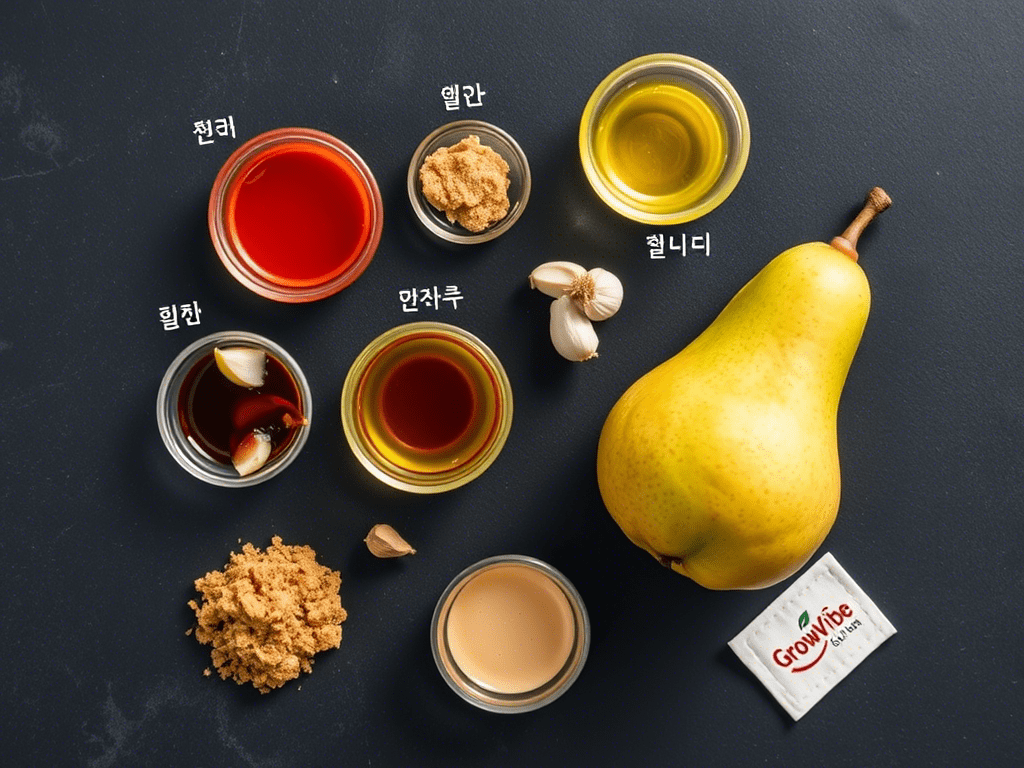
- Soy Sauce: The salty, umami-packed base of the sauce. Go for low-sodium if you want more control over the final taste.
- Gochujang: Fermented Korean chili paste that adds heat, depth, and a signature Korean flavor. It’s the star ingredient in most Korean barbecue recipes.
- Sesame Oil: Adds a nutty aroma and silky finish. Toasted sesame oil is a must for that authentic touch.
- Brown Sugar or Honey: Sweetens the deal. Brown sugar gives it a deeper flavor, while honey adds smoothness.
- Garlic & Ginger: Fresh and fragrant, these two bring warmth, kick, and complexity. Don’t skimp.
- Rice Vinegar: A splash of tang to brighten the sauce and balance the richness.
- Pear or Apple Purée (optional but traditional): Common in bulgogi marinades, this adds natural sweetness and helps tenderize meat.
- Black Pepper or Korean Chili Flakes (gochugaru): For extra heat and depth of flavor.
Some versions even toss in mirin, scallions, or a bit of cornstarch to thicken it up into a Korean BBQ dipping sauce that’s ideal for grilled meats, crispy tofu, or roasted veggies.
This combination of ingredients creates a bold, complex sauce that’s truly at the heart of any great Korean barbecue sauce. Homemade or store-bought, it’s all about balancing those key flavors.
How to Make Authentic Korean BBQ Sauce at Home
Making your own Korean BBQ sauce at home is surprisingly easy and honestly, kind of addictive. You get to control the heat, sweetness, and boldness while keeping it fresh and preservative-free.
Here’s a quick and delicious homemade version you can whip up in under 10 minutes:
Ingredients:
- ¼ cup soy sauce
- 2 tablespoons brown sugar
- 1 tablespoon gochujang (Korean chili paste)
- 1 tablespoon sesame oil
- 1 tablespoon rice vinegar
- 1 tablespoon minced garlic
- 1 teaspoon grated ginger
- 1–2 teaspoons honey (optional for extra sweetness)
- 1 tablespoon grated Asian pear or apple (optional, but adds a nice depth)
Instructions:
- In a small saucepan, combine all ingredients over medium heat.
- Stir continuously until the sugar is dissolved and the sauce begins to thicken (about 3–5 minutes).
- Remove from heat and let it cool. It will thicken more as it cools.
- Use immediately or store in a sealed jar in the fridge for up to one week.
This homemade Korean barbecue sauce works beautifully as a marinade or glaze for grilled beef, chicken, or even tofu. You can also use it as a Korean BBQ dipping sauce for spring rolls or dumplings.
Pro tip: If you’re planning a full-on Korean barbecue recipe night, double the batch. It goes fast.
Quick Dipping Sauce Variation (5-Minute Fix)
Short on time but craving that bold Korean flavor? This Korean BBQ dipping sauce variation is perfect when you need a quick hit of deliciousness. No cooking, no complicated prep. Just bold flavor in a flash.
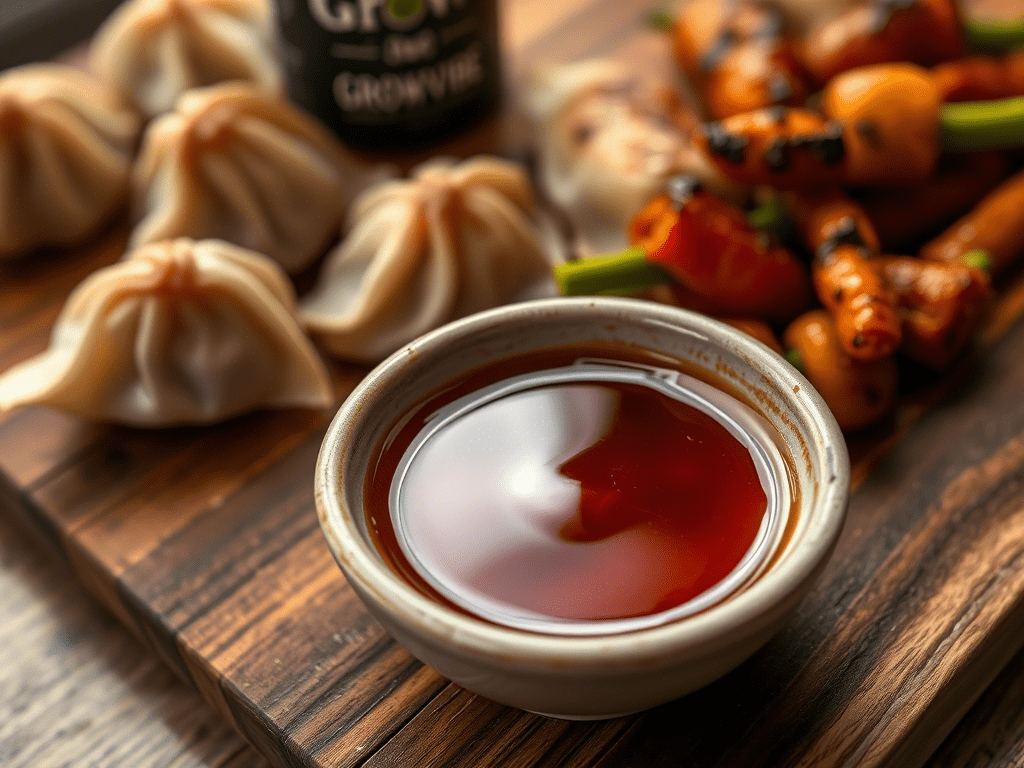
5-Minute Dipping Sauce Recipe:
- 2 tablespoons soy sauce
- 1 teaspoon gochujang
- 1 teaspoon sesame oil
- ½ teaspoon rice vinegar
- 1 teaspoon honey or brown sugar
- 1 clove garlic (minced or grated)
- Optional: Pinch of toasted sesame seeds or sliced scallions for garnish
Whisk everything in a small bowl until it’s smooth and glossy. That’s it. You now have a perfectly balanced Korean BBQ dipping sauce that pairs with everything from dumplings and lettuce wraps to grilled shrimp and tofu bites.
Want a spicier version? Add a pinch of Korean chili flakes. Prefer something milder? Reduce the gochujang and add a touch more sweetness.
This quick dipping sauce also makes a tasty drizzle for rice bowls or bibimbap. If you’re hosting a barbecue, set out a bowl of this next to the grilled meats. It adds instant flavor and looks impressive with almost zero effort.
Best Ways to Use Korean BBQ Sauce
Korean BBQ sauce isn’t just for traditional Korean dishes. Its bold, savory-sweet flavor makes it one of the most versatile condiments in your kitchen. Whether you’re meal-prepping or throwing a last-minute dinner together, here are some irresistible ways to use it:
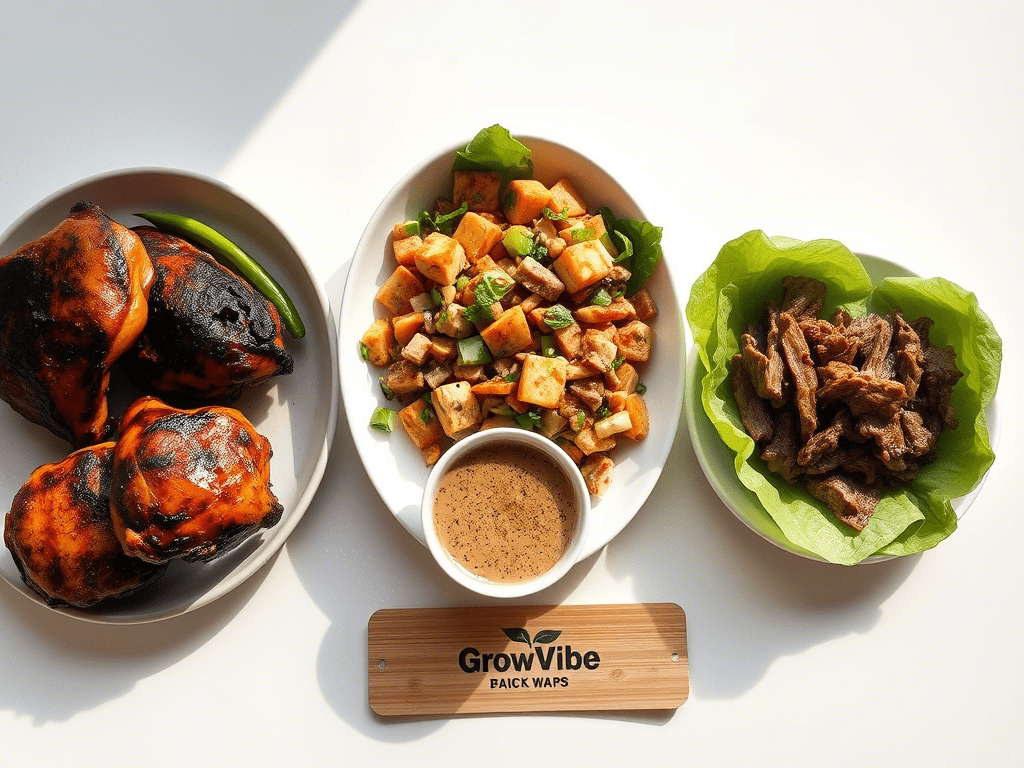
Marinade Magic
Use it as a marinade for beef, chicken, pork, or tofu. Just coat your protein in the sauce and let it sit for 30 minutes or more. It helps tenderize the meat and packs in tons of flavor.
Glaze It On
Brush it over grilled ribs, chicken wings, or roasted veggies during the last few minutes of cooking. The sugars in the sauce caramelize beautifully, giving your dish that perfect sticky finish.
Dipping Delight
Serve it as a Korean BBQ dipping sauce for dumplings, lettuce wraps, spring rolls, or even fries. It adds a bold kick that beats ketchup any day.
Stir-Fry & Bowls
Drizzle it over rice bowls, bibimbap, or stir-fried noodles. Just a spoonful takes the entire dish to the next level.
Fusion Ideas
Try it in tacos with grilled meat and slaw, as a pizza base for Korean BBQ pizza, or even on burgers for a Korean-American twist. It also works well in wraps, sliders, and panini sandwiches.
Wherever you use it, Korean barbecue sauce brings intense flavor and a satisfying umami depth that can transform even the simplest meals.
Store-Bought vs Homemade Korean BBQ Sauce
When it comes to choosing between homemade and store-bought Korean BBQ sauce, it all depends on what you’re looking for. Both options bring serious flavor, but the right pick depends on your time, taste preferences, and cooking habits.
Homemade Sauce
Making your own Korean barbecue sauce gives you full control over everything that goes in. Want it spicier? Add more gochujang. Prefer it sweeter? Adjust the honey or brown sugar. You can even make it gluten-free or low-sodium depending on your dietary needs.
Homemade sauces also offer that fresh, bold taste that bottled versions often miss. You can tweak the flavor profile to match your dish, from smoky ribs to grilled tofu. Plus, if you make a large batch, you can store it in the fridge for several days and use it across multiple meals.
Store-Bought Options
Sometimes, you just need a quick fix and that’s where store-bought Korean BBQ sauce really comes in handy. It’s ready to go and requires zero prep, making it perfect for busy weeknights or when you’re cooking for a crowd.
Brands like CJ Bibigo, Chung Jung One, and Annie Chun’s offer a wide variety of sauces that blend sweetness, heat, and umami beautifully. Look for options with clean labels, especially if you’re aiming for fewer preservatives or added sugars.
Final Take
If you enjoy cooking from scratch and customizing your flavors, homemade sauce is a great option. If convenience is your top priority, a trusted store-bought Korean barbecue sauce will save you time while still delivering big flavor.
In reality, having both options in your kitchen gives you the flexibility to cook how you want, when you want.
Korean BBQ Sauce Pairing Ideas
Korean BBQ sauce is incredibly versatile, which is why it’s become a go-to condiment in so many kitchens. Whether you’re preparing a full Korean barbecue recipe or just looking to upgrade a weeknight dinner, this sauce fits into countless dishes.
Perfect Protein Pairings
- Beef Bulgogi or Galbi: Marinate thin slices of beef in Korean BBQ sauce for a classic, mouthwatering result. Add grilled onions or mushrooms for even more depth.
- Chicken Thighs or Wings: Use the sauce as both a marinade and a glaze. It caramelizes beautifully and adds bold flavor to grilled or baked chicken.
- Pork Belly or Ribs: Brush the sauce on during the last few minutes of cooking for a sticky, sweet, and spicy finish.
Plant-Based Favorites
- Grilled Tofu or Tempeh: Marinate tofu cubes in Korean BBQ sauce, then pan-fry or grill until crispy.
- Roasted Vegetables: Drizzle over broccoli, eggplant, or carrots before roasting for a sweet and savory glaze.
- Veggie Burgers or Wraps: Swap out ketchup for a spicy-sweet Korean BBQ dipping sauce to give your plant-based dishes a Korean-inspired twist.
Rice and Noodle Bowls
- Bibimbap: Top your bowl with sautéed veggies, a fried egg, and a drizzle of Korean barbecue sauce for instant flavor.
- Fried Rice or Stir-Fry: Add a spoonful to your wok for extra depth and a burst of umami.
Snack and Appetizer Ideas
- Lettuce Wraps (Ssambap): Pair grilled meats with rice, fresh greens, and a side of Korean BBQ dipping sauce.
- Spring Rolls or Dumplings: Skip the soy sauce and serve these with a small bowl of Korean barbeque dipping sauce for a more exciting bite.
Whether you’re building a full meal or just need a powerful sauce to take your leftovers up a notch, Korean BBQ sauce delivers flavor that’s hard to beat.
Common Mistakes to Avoid
Using Korean BBQ sauce might seem simple, but there are a few easy-to-make mistakes that can throw off your flavor game. Whether you’re cooking from scratch or reaching for a bottle, here’s what to watch out for.
Skipping Key Ingredients
If you’re making it at home and wondering what is in Korean BBQ sauce, don’t leave out the essentials. Ingredients like gochujang, soy sauce, sesame oil, garlic, and a sweetener work together to create the perfect balance. Skipping even one of these can make the sauce fall flat.
Over-marinating Your Meat
Korean BBQ sauce contains sugar and acidic ingredients, which are great for flavor, but if you marinate meat for too long, especially thin cuts like bulgogi, it can break down the texture too much. Stick to 30 minutes to 2 hours max for best results.
Using the Sauce Too Early on the Grill
If you’re grilling, don’t brush the sauce on too soon. The sugars in the sauce can burn fast, especially over high heat. Wait until the last few minutes of cooking to add that glossy glaze.
Not Balancing Sweet and Spicy
Some people go heavy on the sugar or overload the heat. The real power of Korean BBQ sauce lies in the balance. Too much of one thing throws everything off. Taste and adjust as you go, especially if you’re tweaking a Korean barbecue recipe.
Using the Wrong Type of Soy Sauce
Light soy sauce is standard for most recipes. Using dark soy sauce can make the flavor too heavy and the color too intense. Double-check the label when you’re recreating a traditional Korean barbecue sauce at home.
Avoiding these mistakes helps you get the most out of your sauce—whether you’re making it fresh or pouring it straight from the bottle.
How to Store and Reuse Korean BBQ Sauce
Whether you’ve made a homemade batch or popped open a bottle, proper storage helps keep your Korean BBQ sauce fresh, safe, and full of flavor. And the good news? It’s easy.
Storing Homemade Sauce
If you made your own sauce and are wondering how long it lasts, you’re in luck. Store your Korean barbecue sauce in an airtight jar or container in the refrigerator. It’ll stay good for up to one week. For longer storage, pour it into an ice cube tray and freeze in portions. That way, you can grab what you need, when you need it.
Storing Store-Bought Sauce
Most bottled sauces are shelf-stable until opened. Once opened, seal the cap tightly and keep it in the fridge. Always check the label for specific storage instructions, but most brands stay fresh for several months after opening.
Reusing with Safety in Mind
If you’ve used Korean BBQ sauce as a marinade, don’t reuse the same portion directly as a dipping sauce unless you boil it first. Cooking kills off any bacteria from raw meat. For best practice, set some sauce aside before marinating if you plan to serve it later.
Creative Ways to Reuse Leftovers
Got leftover sauce? Use it as:
- A base for stir-fry or fried rice
- A drizzle over grilled vegetables or wraps
- A glaze for oven-roasted tofu or salmon
- A flavorful kick for noodle bowls and soups
When you know what is in Korean BBQ sauce, you can get creative with how you use it. Its sweet and savory profile makes it perfect for a wide range of meals beyond barbecue night.
Best Korean BBQ Sauce Brands to Try
If you’re not ready to make your own or just want something fast and reliable, there are some fantastic Korean BBQ sauce brands out there. These bottled options bring bold flavor straight to your kitchen with zero prep.
1. CJ Bibigo Korean BBQ Sauce – Original
One of the most popular choices in the U.S., Bibigo’s version is a balanced blend of sweet, salty, and smoky. It’s great for bulgogi, galbi, or even dipping grilled chicken. You can often find this brand in major grocery stores or online.
2. Chung Jung One Korean BBQ Sauce for Beef
This sauce is made specifically for beef marinades. It includes Asian pear and apple for that authentic sweet touch you’d expect in a traditional Korean barbecue sauce. It also makes a fantastic stir-fry base.
3. Annie Chun’s Korean-Style Sweet & Spicy BBQ Sauce
A more modern take, this sauce leans slightly sweeter and works great for fusion dishes like Korean BBQ pizza or burgers. It’s a good pick if you want a milder heat level but still crave bold flavor.
4. We Rub You Korean BBQ Marinade
This small-batch sauce has clean ingredients and no artificial preservatives. It’s a great choice if you’re looking for a more natural, handcrafted feel.
5. Mother-in-Law’s Gochujang Korean BBQ
If you’re wondering what is in Korean BBQ sauce and want something with a deeper fermented flavor, this one adds extra complexity thanks to its gochujang base. It’s ideal for foodies and fans of bold heat.
Tips for Buying
- Always check the label for ingredients like high-fructose corn syrup or excessive sodium.
- Look for sauces that include sesame oil, gochujang, and garlic for that real-deal flavor.
- Choose based on the dish: some sauces are made specifically for beef or pork, while others are more versatile.
With the right bottled Korean BBQ sauce, you can skip the prep and still enjoy a restaurant-worthy meal at home.
FAQs About Korean BBQ Sauce
What’s in it?
Most recipes include soy sauce, fermented chili paste, sesame oil, garlic, a sweetener like brown sugar or honey, and rice vinegar. Some versions also add pear or apple for natural sweetness and tenderizing.
Is it spicy?
It can be, but not always. The heat level depends on how much chili paste or flakes are used. Some versions are mild and sweet, while others bring noticeable heat.
Can I use it as a marinade?
Yes. It works great for marinating beef, chicken, tofu, or even vegetables. Just avoid soaking thin cuts for too long to prevent mushy textures.
How is it different from American barbecue sauce?
American sauces are usually tomato-based with a strong smoky-sweet profile. This one is lighter, more savory, and uses ingredients like soy sauce and fermented paste to build flavor.
Can I use it for dipping?
Definitely. It pairs perfectly with dumplings, lettuce wraps, grilled skewers, or roasted appetizers.
Final Thoughts
Now that you know what’s in Korean BBQ sauce, how to make it, use it, and store it, it’s time to put that knowledge to work. Whether you’re grilling, marinating, or just dipping, this sauce is a kitchen essential.
Explore More on GrowVibe
- Chicken Seasoning for Grilled Dishes – Learn how to spice chicken the right way, from Korean BBQ to everyday meals.
- One-Pan Chicken Over Rice Recipes – Pair your BBQ sauce with these easy, flavorful dinners.
- Sweet and Sour Sauce Recipe – Another bold sauce to keep in your rotation.
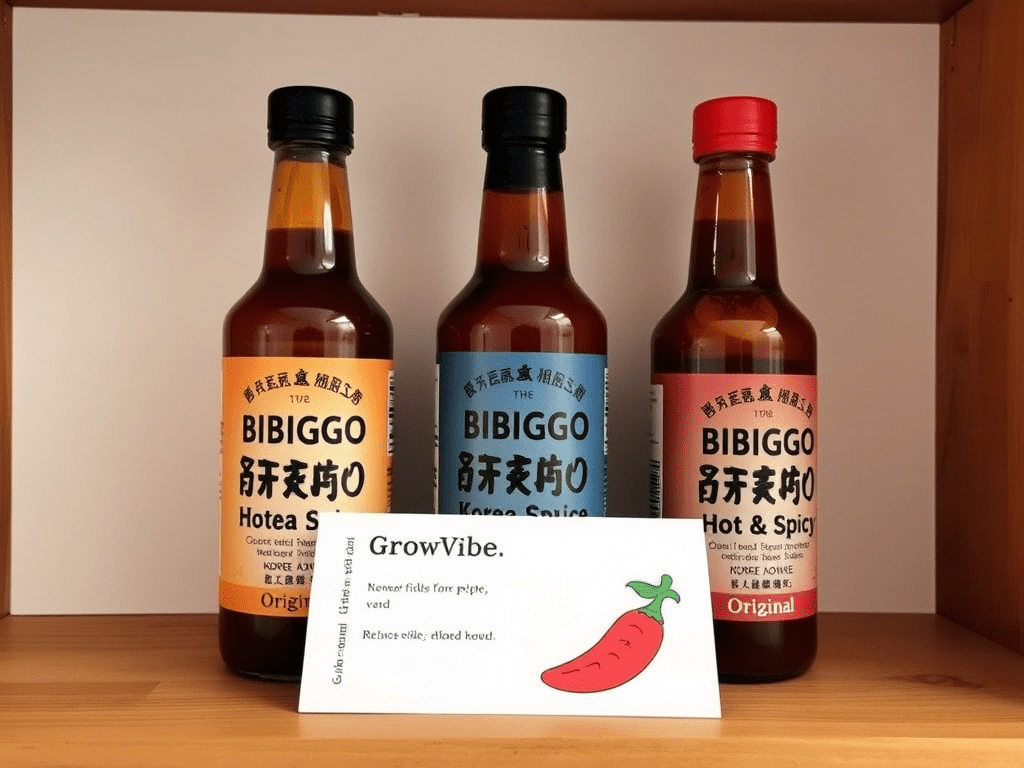
Top Korean BBQ Sauces on Amazon
- Bibigo Korean BBQ Sauce, Original, 16.9 oz – Classic flavor with hints of pear and garlic, perfect for bulgogi and grilled chicken.
- Bibigo Korean BBQ Sauce, Hot & Spicy, 3 Pack – Bring the heat with this spicy version loved by fans of authentic Korean flavor.
- Bibigo Korean BBQ Sauce, Drizzle Pack, 6 Bottles – Great for drizzling over rice bowls, wraps, or using as a quick glaze.
🧠 Pro Tip:
Want the best results? Start with Bibigo Original for balance, level up with the Spicy Pack for heat, and keep the Drizzle Bottles around for quick meals.




